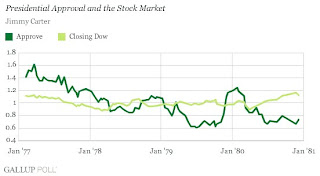Over at the commodity markets, gold’s and silver’s recent bounce could yet signal a reprieve to the market’s selloff.
On the one hand, this bounce could signify a reaction to extremely oversold levels but may not be indicative of a bottom yet.
On the other hand, if gold and silver have found a bottom then they could likely be signaling the coming tsunami of inflationism, where the tendency is that gold leads other assets in a recovery, perhaps like 2008.
Also, the recent bounce came amidst Greek polls exhibiting improvements of the standings of pro-austerity camp, perhaps indicative of reduced odds of a Greece exit. A victory by pro-bailout camp government would allow the ECB to orchestrate the same operations that it has been conducting at the start of the year.
For most of the past 3 years prices of gold and the US S&P 500 have been correlated but with a time lag. Since March an anomalous divergence occurred, the S&P rose as the gold fell. For most of the past two weeks both gold and the S&P fumbled which seem to have closed the divergence gap.
But over the two days gold rose as stocks fell. Such anomaly will be resolved soon.
Again, gold cannot be seen as a standalone commodity and should be seen in the context of both the general commodity sphere and of other financial assets.
Focusing on gold alone misses the point that gold represents one of the contemporary assets that competes for an investor’s money. Such that changes in the gold prices would likewise affect prices of other relative assets.
Prices are all interconnected, the great Henry Hazlitt explained[1]
No single price, therefore, can be considered an isolated object in itself. It is interrelated with all other prices. It is precisely through these interrelationships that society is able to solve the immensely difficult and always changing problem of how to allocate production among thousands of different commodities and services so that each may be supplied as nearly as possible in relation to the comparative urgency of the need or desire for it.
To fixate only on gold without examining the actions of other assets would risk the misreading of the gold and other asset markets.
Let me further add that a Greece exit or a collapse of the Euro doesn’t automatically mean higher gold prices. This entirely depends on the actions of central banks.
Since gold is not yet money today, based on the incumbent legal tender laws, it would be totally absurd to argue that under today’s fiat money system—where financial contracts have been underwritten on paper currencies mostly denominated in US dollars or the foreign currency alternatives, European euro, British pound, Swiss franc, Japanese yen or even China’s renminbi—all debt liquidations, be it ‘calling in of loans’ or ‘margin calls’ will be consummated in paper money currency and not in gold.
This means that a genuine debt deflation would translate to greater demand for cash balance (based on Irving Fisher’s account of debt deflation[2]) which means more demand for the US dollar and other currencies of ex-euro trade counterparties.
And that’s what has been happening lately to the marketplace, the US dollar (USD) and US Treasuries 10 year prices (UST) has risen opposite to falling gold prices and other financial assets.
This means part of the global system has been enduring stresses from debt liquidations, which again bolsters the relative effects of money and boom bust cycles.
As pointed out before[3], it would be mistake to equate the 1930 eras (gold bullion standard) or the 1940 eras (Bretton Woods standard) with today’s digital and fiat money system. That would be reading trees for forest when gold was officially money then.
And given that gold has long been branded a “barbaric relic” and has practically been taken off the consciousness of the general public in Western nations, gold has hardly been appreciated as money, perhaps until a disaster happens.
It has only been recently and due to sustained gains of gold prices where gold’s importance has begun to percolate into the American public[4].
Yet the Americans see gold more of an investment than as money
But of course, this is different with many Asians who still values gold as money. For example, many Vietnam banks are even paying gold owners fee for storage[5] in defiance of government edict.
Gold’s rise would be premised from central banking inflationism designed to protect the certain political interests, which today have represented the banking institutions and the Federal and national governments.
As proof, the latest quasi bank run in Greece, which I pointed out above, has reportedly been due to concerns over devaluation of the drachma, should Greece exit from the EU and NOT from deflation.
While I remain long term bullish gold, short term I remain neutral and would like see further improvements in gold’s price trend and subsequently the relative trends of other “risk ON” assets.
[1] Hazlitt Henry How Should Prices Be Determined? , May 18, 2012
[2] Wikipedia.org Fisher's formulation, Debt Deflation
[3] See Gold Unlikely A Deflation Hedge June 28, 2012
[4] Gallup.com Gold Still Americans' Top Pick Among Long-Term Investments, April 27, 2012
[5] See Vietnam Banks Pay Gold Owners for Storage, April 12, 2012
























